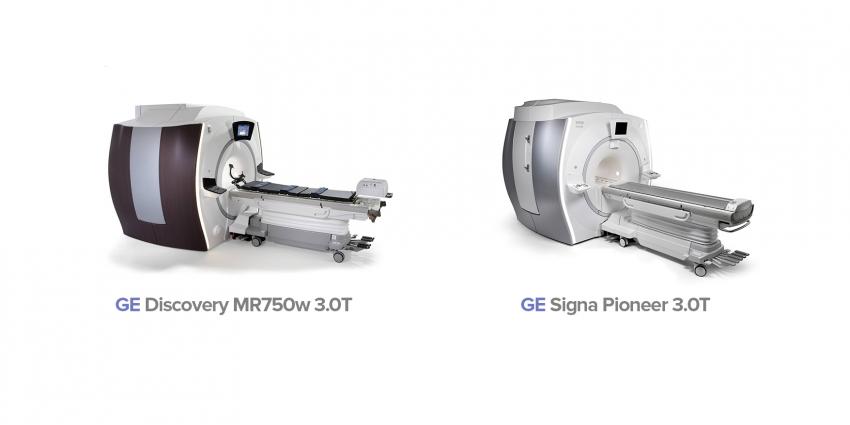THE COMPARATIVE ANALYSIS OF THE MOST POPULAR MRI MACHINES
Magnetic resonance imaging is one of the most informative and safe ways of patient examination. That is why it is important to have a powerful MRI scanner in every major clinic and medical center. Actually, that’s not a problem nowadays. Each year, the most popular medical equipment manufacturers surprise us with their new developments which feature high power capacity, quality images, and reliability. So today, BiMedis is introducing a review of the most popular MRI scanner models.
For many years running, the medical equipment market is witnessing the leadership competition for MRI scanners production. It may safely be said that such manufacturers as GE, Siemens, and Philips are far ahead in this competition.

Discovery MR750w 3.0T and SIGNA Pioneer 3.0T are GE’s powerful new developments among the 3 Tesla MRI scanners with a wide 70 cm gantry aperture. The Discovery MR750w 3.0T machine employs a number of technological innovations including MultiDrive RF Transmit and Optical RF. Besides, convenient and informative 50 cm field of view, high-performance gradient coils, equipped with an air and liquid cooling system, were designed focused on patient care and ensure the machine’s comfortable utilization, high efficiency, and absolute versatility. The SIGNA Pioneer 3.0T MRI machine is another excellent option. Actually, it is the first device in the history of the medical equipment industry to allow combining a multiple contrast image in one MRI scan which includes the following brain examination modes: T1, T2, and Inversion Recovery (for example, DIR., PSIR, FLAIR, etc .). The manufacturers claim SIGNA Pioneer 3.0T to ensure low placement costs – it occupies 25% less space compared to other 3 Tesla scanners, and low operating costs because SIGNA Pioneer is designed to consume approximately 50% less power than any other conventional 3.0T design due to the innovative technology of ultra-high gradient efficiency.
It should be pointed out that the initial costs for GE medical equipment were always higher than those of other manufacturers but your actual maintenance costs will be significantly lower.

The Siemens Company has a wide range of MRI scanners, starting from 0.35T to 7T, and each next equipment generation is improved by introducing new technologies and capabilities. These technologies are incorporated in such popular models as Magnetom Avanto 1.5T, Magnetom Amira 1.5T, and Magnetom Aera 1.5T, as well as in the following powerful 3 Tesla scanners: Magnetom Spectra 3T, Magnetom Trio 3T and the new development Magnetom Vida 3T.
Let us have a look at the MAGNETOM Trio 3T MRI machine which offers a rich set of advanced applications for solving complex clinical and investigation issues due to its Tim® System. This system provides flexibility – up to 102 coil elements can be combined with 32 radio-frequency channels to create a single Total Imaging Matrix – Tim, accuracy – from small FOV to the whole 181 cm high resolution body image, and speed – a complete whole body iPAT without changing the patient’s body position. Among 1.5 Tesla MRI machines, Magnetom Aera 1.5T is an innovative step forward (compared to Magnetom Espree 1.5T which has 70 cm gantry aperture as well). It is highly appraised by experts but difficult to find on the secondary market. Avanto 1.5T may be a good alternative in this case. Though it does not have such a wide gantry aperture, it has a similar interface and a field of view. Besides, there is one more feature which has to be highlighted – unlike Philips, Siemens incorporates a “zero helium boil-off” technology into its scanners, and it is extremely efficient facilitating low helium consumption.

The most popular Philips machines are the Ingenia MRI scanners family which includes a range of 1.5 Tesla and 3 Tesla MRI scanners. Philips Ingenia 1.5T has become the most popular among other machines, and we are now going to tell you about it.
The Ingenia 1.5T MRI machine has a wide 70 cm gantry aperture and operates at 45 mT/m and 200 mT/m/ms, providing excellent image quality and patient comfort. Besides, it is designed based on the dStream architecture. This MRI system is the first of its kind to digitize the MR signal in immediate proximity to a patient – in the RF coil to be more specific. In addition, thanks to DirectDigital and FlexStream technologies, the signal-to-noise ratio is improved up to 40%. However, do not forget about increased helium consumption by Philips MRI systems. So, we advise you to sign a maintenance contract for your MRI machine which will also include helium system recharge.
If Philips Ingenia 1.5T is not affordable for you, consider already renowned Philips Achieva 1.5T or Philips Intera 1.5T as a good option.
And what is most important: always choose medical equipment carefully weighing up all the pros and cons, because patients' health is in your hands.
25.05.2017